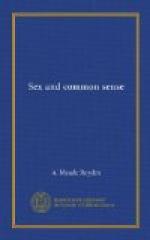an expression of the love of the spirit, the perfect
final expression, the sacrament of love. Do not
imagine that this is not needed, this effort, and
this power, by every human being who desires to be
human in his love, and not something less than human.
And to those to whom the need comes in its sternest
form, I will not pretend for a moment that it is not
hard. Nay, I will prophesy to you that if you
do so choose to serve the world, it will to all of
you sometimes seem too hard. With Christ, with
St. Francis, your human nature will sometimes assert
itself. “The foxes have holes, and the birds
of the air have nests, but the Son of Man”—the
Servant of Humanity—has no such joy.
But of whatever life you choose, that is sometimes
true. To the finest spirit in marriage there
comes sometimes the thought that, but for this great
claim, he might have undertaken some adventure, might
have answered some call, which now he cannot answer.
Does that mean that he regrets his choice? No,
not for a moment! It only means that human nature
is so rich and so varied that whatever life you forego
will sometimes seem to you the better choice.
You will think, for a moment, that you might have
chosen differently. If that happened to St. Francis,
believe me, it will happen to you. But yet, is
it not a heroic path that I point out to you?
Is it not possible that to this generation heroism
may be possible in such a way, on such a scale, that
you will leave this world nobler in moral stature
because of the hardness which you endured, the choice
that you made? Women, to whom this comes home
specially at this time, may it not be that you, by
taking this way, will become the mothers in spirit
of women in a happier generation, on whom will never
again be imposed our cramped, stifling, sub-human conception
of what women ought to be? You will show to the
world not only that the individual woman of genius
may have a value to Humanity beyond her sex, but that
every woman has that value. In solving your own
problem, and taking hold of life where most it hurts
you, you will end by making a moral standard nobler,
a humanity richer and more human, a womanhood freer,
greater, more Christlike than it was. And future
generations shall rise up and call you blessed.
III
CONSIDERATION OF OTHER SOLUTIONS OF THE PROBLEM OF THE DISPROPORTION OF THE SEXES
“My
spirit’s bark is driven
Far from the shore,
far from the trembling throng
Whose sails were never
to the tempest given.”
Shelley: “Adonais.”
Let us now move away from that aspect of the moral problem which has concerned us hitherto—that of the difficulties created by the disproportion of the sexes at this time and in this country—and consider the problem as it presents itself under more normal conditions. For even in ages and in countries where there are an equal number of men and women there are difficulties in their relations with one another, and a “moral problem.”




